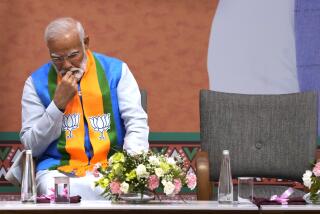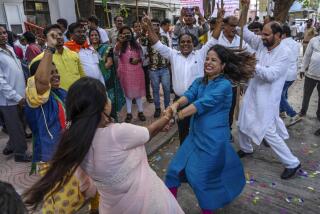Gandhi Party Defeated; Foes Plan Coalition
- Share via
NEW DELHI — Prime Minister Rajiv Gandhi’s Congress-I party appeared to have resigned itself Monday to its second-worst election defeat in four decades, and jubilant opposition leaders began laying the groundwork for an unlikely coalition.
With final returns confirming projections that Gandhi’s party had lost its majority in Parliament, a Congress-I spokesman conceded that “yes, something did go wrong with us.”
“We are going to look inwards,” the spokesman, Anand Sharma, added. “We are not blind.”
Final returns in the voting for more than 400 of the 525 seats at stake confirmed that the opposition coalition headed by former Defense Minister V. P. Singh had also failed to win a majority of the 543 seats in Parliament. This left India in a political stalemate for the first time since independence from Britain in 1947.
“It’s real politics now, party politics at its best,” said Prannoy Roy, a statistical analyst. Roy’s computer projection indicated that when all results are in later in the week, Gandhi’s party will have won 200 seats, against 150 for Singh’s National Front.
Despite Congress-I’s showing as the No. 1 single party, independent analysts and Indian constitutional experts speculated that the opposition is likely to be called on to form a government.
Nani Ardeshir Palkhivala, a legal expert, said that the “anti-Establishment” vote demonstrates that India “is not merely ripe for a change, it is yearning for a change.”
“It would be going against the true will of the people,” he said, “if the president went only according to numerical factors.”
He said a minority government of the widely divergent opposition parties might be more stable than a coalition based on Congress-I because of what he called a “popular mandate for change.”
The ultimate decision lies with President Ramaswami Venkataraman. The presidency is a largely ceremonial post, but after an indecisive election it takes on considerable power because it is the president who decides which party can command the confidence of Parliament.
Opposition leaders have expressed concern that Venkataraman will be influenced by the fact that he was appointed by Gandhi. But most analysts expect the president, who is viewed as a respected elder statesman despite his personal loyalty to Gandhi, to act independently.
In order for the National Front to form a government, it must have the support of the Communist Party and the Bharatiya Janata, an extreme right-wing party of Hindu nationalists that emerged as the No. 3 political force with at least 79 seats in Parliament. The leftists and the Hindu nationalists allied with the National Front for the election campaign, but the three ran on divergent platforms.
After a flurry of opposition meetings Monday, it appeared that such a coalition will be possible. Meetings have been scheduled throughout the week to complete arrangements for what Sharma, the Congress-I spokesman, called an “ill-matched marriage of political convenience.”
Sharma indicated that Gandhi is making no attempt to seek out coalition partners and seemed to be resigned to an opposition government coming to power.
“We do not go to anybody seeking support,” Sharma told reporters, adding that the party refuses to “compromise its principles.”
“During the campaign,” he said, “our message to the voters was a choice between stability and instability, order and chaos, between development and stagnation. In the next few weeks, perhaps many of you will come to agree.”
Gandhi has not appeared in public since officials began counting the millions of ballots Sunday morning. Partial returns indicated that Gandhi was leading in his parliamentary race in Amethi, where the federal election commission ordered another round of voting in many areas after reports of violence and fraud.
On the basis of statements by party spokesman Sharma and other officials of the Gandhi party, it seemed clear that Congress-I had all but resigned itself to a new role as the opposition.
K. Natwar Singh, who lost his bid for reelection after serving as Gandhi’s deputy foreign minister for the past five years, said: “We have to sit down and reflect. There was a wave, and I think it was just an angry, negative vote.”
Asked whether the coming days of uncertainty and apparent political instability will affect India’s image abroad, Singh replied: “I think there will be a very great deal of anxiety. The firm hold the government should have on internal and foreign affairs will be missing.”
Another Congress-I leader, Sharad Pawar, chief minister of the state of Maharashtra, which delivered a victory for Congress-I, said: “It looks like people might be in the mood to support some other political thinking. And if that is the case, well then, all right, we will sit in the opposition. What is wrong with sitting in the opposition?”
Pawar, who has been mentioned as a possible candidate to replace Gandhi as head of the party if Gandhi resigns, declined to answer questions about the party leadership.
Party spokesman Sharma denied that there was any movement in the party to dump Gandhi.
“The party is solidly united,” he said, “and the leader is Rajiv Gandhi, today and for the future. There is no doubt about that.
More to Read
Sign up for Essential California
The most important California stories and recommendations in your inbox every morning.
You may occasionally receive promotional content from the Los Angeles Times.













